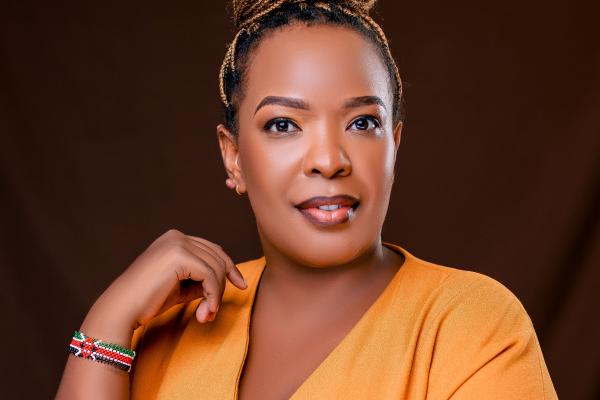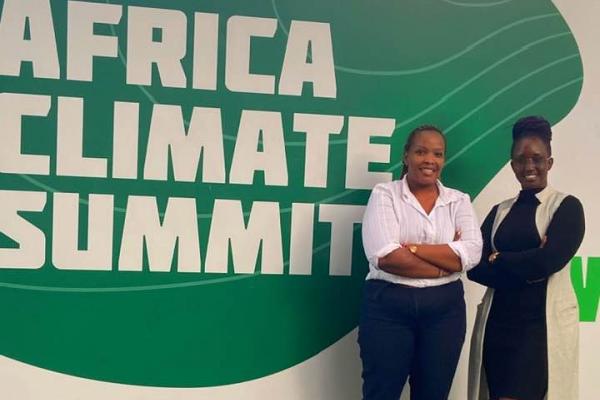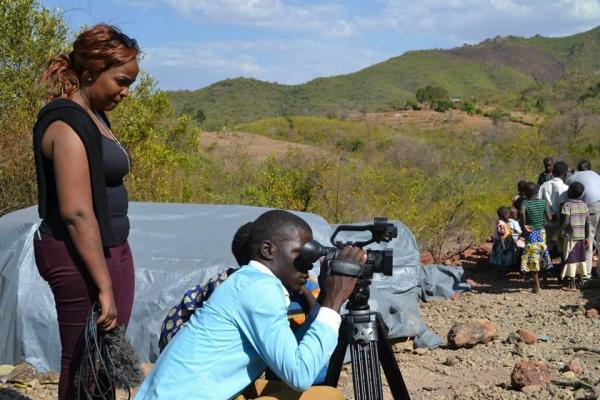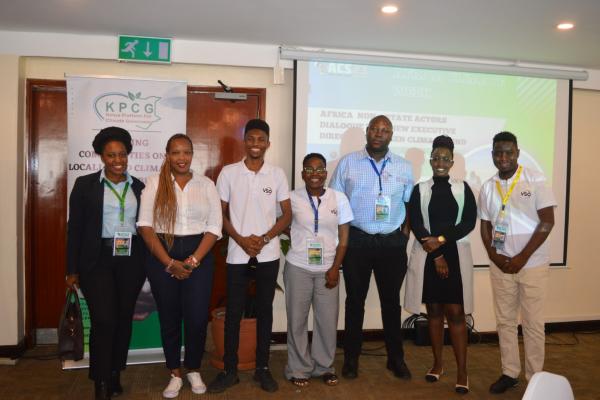Margaret NjukiIn the newsroom, we did stories to inform, entertain, and educate. Here, you're not only doing that, but you’re effecting social change in a cause driven organisation. You're mobilising people to act."
Volunteer Facilitator Kenya
"My full name is Margaret Njuki, but I prefer Maggie, as I find Margaret a bit too formal. Anyone who knows me knows I give off an unserious kind of demeanour.
I'm a trained journalist with a diploma in journalism, then later a Bachelor of Arts in Communication at the University of Nairobi. I started out as a junior reporter, moving into features reporting, and later a sub-editor.

I have worked in three different media houses in in Kenya, mostly covering human interest and health-focused stories, as those interest me the most. Stories that were focused on women, health issues, children, and most recently climate change.
In that time I interacted with several aid agencies; they would take us to see their various projects, and in turn we’d do the storytelling. That's where my interest in development work started.
Why did you choose to work for VSO?
While I was working as a reporter, I wanted to be on the other side of the equation. I wanted to be in the development world, working with the communities, not being the reporter who's covering them.
My plan was to get at least two years in the newsroom and then actively start looking for roles in the development sector. But then, COVID-19 happened, and I lost my job like many others did.
As I was still lazing around at home making banana bread like everyone else in the world at that time, everything had changed in media houses with the rise of digital media, so I thought I needed to pivot.
I started taking online courses, and someone in my circle suggested that I could hone my skills in communication as a volunteer with VSO. That really drove me to find out more about VSO, and that's when I applied.
When I logged into the website to explore roles and apply, there wasn't a formal rigid employment template. From the way the advertisement was done, how you were encouraged to volunteer, and the stories that were published on the website, you could see it was really something out of the norm and something you would want to get involved in.
I was excited when I applied because it's something that I was hoping to get involved into much later, but I didn't know it was so accessible – it was just right there.
What's your role at VSO?

I joined VSO in 2021. In the beginning, I was facilitating trainings and coordinating events. With time I've been able to get involved in communications and advocacy.
I've always been a storyteller, and working with aid agencies and other NGOs gave me this front-row seat to communities and their stories.
I found that a lot of it didn’t resonate with my editor at the time, but I still wanted to share them. That's what prompted me to start my blog; I knew I had to find a place to tell these stories.
My interactions with these communities really opened my eyes to the challenges that many of us will never experience. I’ve been able to see the world in a different way and I want everyone to have that view. That's what drives me.
Locally, I was inspired by journalist Janet Mbugua who has since moved onto development, and I continue to admire her work. Internationally, I always aspired to tell stories in the way Christian Amanpour does.
Writing is an innate thing. I started writing in high school and was part of the journalism club. I remember my literature teacher would refer other students to me and ask them to learn a thing or two about prose, sentence construction, cohesion and how you combine all this information to making a story. I think that's where I started thinking, this is what I want to do, this is what I enjoy, this is what comes easy to me.
After high school, I still had no clear direction of what I want to do, but I still found myself wanting to pursue some kind of career in writing.
When someone suggested I try journalism, I thought I'm not much of a spotlight person, but I'll try it out. I joined the newsroom, and of course there were inspiring voices that I wanted to follow.
What do you think makes a good storyteller writing for social change?

When I write a story, I want to evoke emotion from the reader; I want them to learn something and be entertained. To do all those things, you have to write with the utmost clarity.
The NGO sector, just like any other, has its own language and way of communicating. To an outsider, that’s just jargon – and that's where storytellers come in.
We try and simplify all this jargon, all these analytics, all this data into simple terms while still making it creative and engaging. Most importantly, you can turn a one-way message into a two-way street; a good story will grasp your readers’ interest while they read it, a great story will give them something to do next with a strong call to action.
In the newsroom we did stories to inform, entertain, and educate. Here, you're not only doing that, but you’re effecting social change in a cause driven organisation. You're mobilising people to act.
A good story should have these things: emotion, clarity, creativity, and a call to action.
How do you think stories or content in the NGO sector have evolved over the years?
In the age of digital media, a lot has changed. Before, most organisations relied on traditional media for their storytelling through media engagements. INGO’s now have dedicated communications departments that spearhead storytelling. Storytelling has become individualised as well as interactive making it relatable across board.
INGO’s are also using of technology and data to tell their stories through evidence-based insights.
Do you think there's been any shift in how skill-based volunteering is presented across the media?
Definitely. With the complexities of the world and the evolution of things like digital media, there has been a need to shift from traditional volunteering to targeted or skill-based volunteering.
What do you like best about your role?

The highlight of my work is obviously the engagement that I get from the stories – that instant feedback that will later translate to impact. The first time I experienced this was when I was doing a story in one of the media houses I was working for.
In Kenya we have open-air markets, and I was covering a story about a homeless vulnerable group of people. They did many tasks in the thrift during the day for the store’s owners, such as carrying luggage from one point to the other. But they had no permanent residence in Nairobi or anywhere else, even the women.
It was a vulnerable group, mostly women with young kids, and one shared the challenges they were going through in terms of food and shelter, and they wanted to show me where they were sleeping. There was this dingy hall with mattresses where they would go to sleep at night.
I still remember it; how dingy and dirty it was, yet they were being charged 10 or 20 shillings per night, which many of them struggled to afford. who were sleeping in these places.
I covered their story and the challenges they were going through. It was picked up by a few aid organisations, and eventually one big aid organisation was able to help them with basics like accommodation and food – and later with capacity building and training on hygiene. To this day I remember the impact that that story had on these people’s lives.
That's why I love doing what I do. If my story can reach at least one person and change the way they see the world, that is a highlight for me.
How do you think this experience of being at VSO changed you?
There have been significant changes in my professional self and life.
While working in the newsroom, my main objective professionally was to inform, educate and entertain. Now, I still write stories for a living, but my objectives have changed – I want to create a lasting impact; I want to influence policy as well as set the agenda for broader engagements.

I never imagined myself being in this space because, as a storyteller or a media person, I find that I'm more outgoing than any other person or any other average person in a different sector as mine.
I also think, with this shift from media to communications, I'm still on that learning curve. I'm at this point where I think I'm a ‘yes’ person now, I find myself saying yes to anything challenging, anything new. I just want to learn and see where this curve takes me.
What advise would you give someone wanting a career in storytelling?
I want to emphasise that storytelling is a meaningful craft that can create a huge impact if done correctly.
I would also want them to understand the cause they’re working for, the cause of the organization they’re working in, and to have empathy, sensitivity, and strive to always be authentic.
What is next for you?
I want to be in a position where I'm influencing storytelling in different organisations. I don't want this to be that corner desk where there's no budget or infrastructure put in place; I want to be in the centre of that shift and that change.
One thing that makes you happy outside of work?
Work brings me joy but... I would say coffee, coffee brings me unimaginable joy."
Life at VSO
Here at VSO, we have a team that operates across the world. Our Life at VSO blog series gives you an insight into what life is like working for a world leading international development through volunteering organisation.
Read more

A ripple of change: how VSO volunteers are transforming communities
Every act of volunteering begins with a choice — a decision to act out of a desire to make a difference. Across the world, VSO volunteers are proving that one spark of action can ignite something much bigger.

The two volunteers empowering girls and young women in Mozambique
Nelma and Carmirene and are two volunteers working on VSO's EAGLE project in Mozambique. For Nelma and Carmirene, education is not just about school, it is about meeting people where they are and using the right tools to challenging harmful norms. Here are their stories.
Opening doors to safety, education, and a brighter future
For girls in Karamoja, the poorest region in Uganda, being forced into early motherhood is all too common. This Christmas, you can open the doors to Safety, Education, and a Brighter Future.
